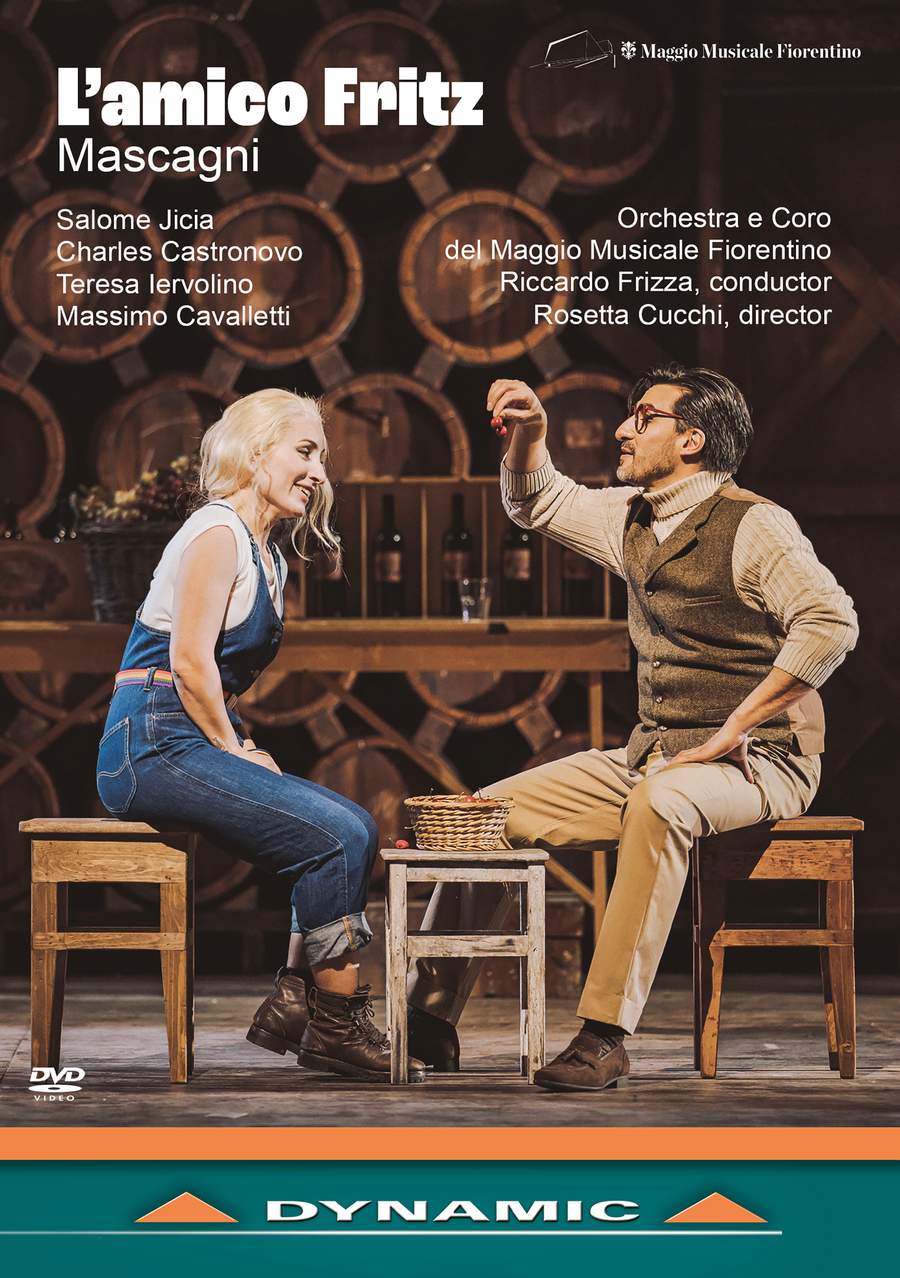MASCAGNI L'amico Fritz (Frizza)
View record and artist detailsRecord and Artist Details
Genre:
Opera
Label: Dynamic
Magazine Review Date: 04/2023
Media Format: Digital Versatile Disc
Media Runtime: 103
Mastering:
DDD
Catalogue Number: 37960

Tracks:
| Composition | Artist Credit |
|---|---|
| (L')amico Fritz |
Pietro Mascagni, Composer
Caterina Meldolesi, Caterina, Soprano Charles Castronovo, Fritz, Tenor Dave Monaco, Federico, Tenor Florence Maggio Musicale Chorus Florence Maggio Musicale Orchestra Francesco Samuele Venuti, Hanezò, Baritone Massimo Cavalletti, Davide, Baritone Riccardo Frizza Salome Jicia, Suzel, Soprano Teresa Iervolino, Beppe, Mezzo soprano |
Author: Richard Lawrence
This will come as a novelty to many people. Friend Fritz has been successfully revived in London by Opera Holland Park, but productions elsewhere seem few and far between. Mascagni wanted to write an opera that was completely different from Cavalleria rusticana, and he certainly succeeded. Gone is the torrid emotion and the violence of 19th-century Sicily; in its place is a gentle commedia lirica set in 19th-century Alsace. Premiered in Rome on October 31, 1891, the year after Cav, it was an immediate success; among those who took it up was Gustav Mahler, at the Hamburg Opera.
The plot is virtually non-existent, the outcome predictable. Fritz, a confirmed bachelor, is steered towards marrying the young and attractive Suzel by his friend David, the local rabbi. If you are deterred by the prospect of 90 minutes of saccharine charm, rest assured that Mascagni’s gift for melody, orchestration and the delineation of character will leave you satisfied. It is a feel-good opera.
Rosetta Cucchi’s production, well filmed by Matteo Ricchetti, moves the action to 20th-century Connecticut. When, exactly? One clue is that Suzel dances around with her headphones attached to what looks like a Walkman cassette player. The outer acts are set not in Fritz’s dining room but in a bar, apartment buildings visible through the picture windows. Bearded, bespectacled Fritz sports pink trousers and a natty jacket; Suzel, a pigtail over her shoulder, is in dungarees. Some might regret the change of setting, inasmuch as it makes the Alsatian references in the music out of place; while Beppe the gypsy, a trouser role, is no gypsy. But in the end it doesn’t really matter. Cucchi evokes a lively society, never overstated, of friendship and good cheer. She adds imaginative touches, too: when David asks Suzel to recount the story of Rebecca, the girl is prompted in dumbshow by a friend – unnoticed by the rabbi – who happens to find a Bible to hand.
Salome Jicia strikes just the right note as Suzel: an ingénue who is no stranger to profound feelings. When she is in despair towards the end, at ‘Non mi resta che il pianto’, Cucchi has neighbours passing by clutching umbrellas, suggesting that the heavens are weeping too: corny, perhaps, but touching. Charles Castronovo makes an admirably lyrical Fritz, with real steel in his voice when provoked by David, a part taken with bluff good humour by Massimo Cavalletti.
There’s succulent support from the orchestra (which reminds me that the famous Cherry Duet is done with grace, culminating in the lovers holding hands over the basket), including an impassioned Intermezzo after Act 2. Passages where the vocal line is doubled in the bass, such as Suzel’s ‘Ah! ditela per me questa parola’, recall Massenet and anticipate Puccini. Riccardo Frizza controls the ebb and flow in masterly fashion. The whole thing is very nicely done.
Discover the world's largest classical music catalogue with Presto Music.

Gramophone Digital Club
- Digital Edition
- Digital Archive
- Reviews Database
- Full website access
From £8.75 / month
Subscribe
Gramophone Full Club
- Print Edition
- Digital Edition
- Digital Archive
- Reviews Database
- Full website access
From £11.00 / month
Subscribe
If you are a library, university or other organisation that would be interested in an institutional subscription to Gramophone please click here for further information.




